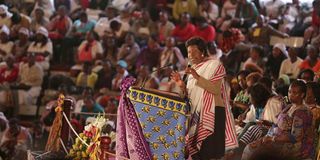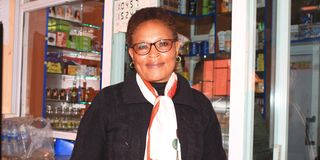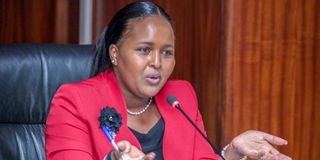The price of power: Women politicians pay more than just money

Former Kitui governor Charity Ngilu address women at Bomas of Kenya in Nairobi during a political convention on March 10, 2017. Kenya's women navigate the high stakes of political ambition.
What you need to know:
- Women politicians face steep costs, both financial and personal, as they navigate a landscape fraught with cultural barriers, discrimination, and systemic challenges.
- Despite progress made since the 2010 Constitution, women's representation in Kenyan politics remains low.
- Resilient leaders like Eddah Njeri, Naisula Lesuuda, and Myllene Bosibori encountered multifaceted obstacles, from exorbitant campaign expenses to sexual harassment and societal prejudices.
- While initiatives to support them show promise, the road to equal representation remains long, calling for comprehensive reforms and a shift in cultural attitudes.
The sun had barely risen over Embu town when Eddah Njeri unlocked the door to one of her M-Pesa shops. As she arranged the day's float, her mind wasn't on mobile money transactions. Instead, it raced with campaign strategies, voter outreach plans, and the daunting financial hurdles that lay ahead. The successful businesswoman, had recently made the bold decision to run for the Kirimiri Ward seat in Manyatta Constituency.
Being a greenhorn in politics, she says, nothing had prepared her for the challenges to expect on the campaign trail and how she would overcome them.
As she embarked on her campaign journey, she would soon face a gauntlet of challenges that would test her resolve, drain her resources, and force her to confront deeply entrenched societal biases.
"I was always involved in community work, and many people were happy with what I was doing. They encouraged me to run for the MCA seat," she recalls, her eyes bright with the memory of her initial enthusiasm. "I also had that strong urge to lead and, therefore, offered myself for election."
But the path from community activist to political candidate was far from smooth. Before she could even begin her campaign in earnest, she faced her first major hurdle: convincing her spouse to support her political ambitions.
"It took some time to convince my husband to give me the nod to plunge into the murky political waters," she admits.
The negotiation was delicate, balancing her aspirations with familial expectations. "After convincing him that I would not abdicate my duties as a wife and mother, I received the much-needed green light, much to my joy."

Eddah Njeri, who contested the Kirimiri Ward seat in Manyatta Constituency during the 2022 General Election in Embu town, on August 2, 2024.
This domestic negotiation, often unnoticed and unremarked upon, is a silent tax that many women pay even before they can announce their candidacy. It's a stark reminder of the additional layers of challenge women face in a society where their political ambitions are often seen as secondary to their roles as wives and mothers.
Eddah's story is not unique.
Across Kenya, women aspiring to political leadership find themselves navigating a treacherous landscape fraught with financial, cultural, and systemic obstacles. As the nation approaches its 61st year of independence, the fight for women's representation in politics remains an uphill battle, with progress measured in inches rather than miles.
In the heart of Samburu County, some 400 kilometres away from Eddah's shop, Samburu West MP Naisula Lesuuda recalls her own harrowing journey to become the first woman elected to represent a single constituency in the region.
"I faced a lot of attacks. I saw hell on earth when I first ran for MP," Lesuuda recounts, her voice carrying the weight of her experiences.
"I was told that I am not married and that I had not undergone female genital mutilation (FGM). I was also told to my face that the people were not ready for a woman MP."
She recalls the blunt rejections she faced, with some people dismissing her candidacy because she wasn’t married or hadn't undergone FGM, while others openly stated that they weren't ready for a woman MP.
Read also: Do gender quotas in elections work?
"They told me to go for the Woman Representative seat that is reserved for women," she continues, referring to the positions created by the 2010 Constitution to increase women's representation.
"But I soldiered on and proved to the people that I was the best suited for the job."

Samburu West MP Naisula Lesuuda during a parliamentary sitting on November 30, 2023.
These stories of resilience and determination paint a vivid picture of the multifaceted challenges women face in pursuing political leadership. From financial burdens and gender discrimination to cultural barriers and outright harassment, the cost of entry into the political arena for women is steep – often prohibitively so.
As Kenya grapples with the implementation of its progressive 2010 Constitution, which emphasises gender equality and women's representation in political leadership, the reality on the ground tells a different story. Despite marginal improvements, women's representation in Parliament remains stubbornly low at just 23 per cent.
The 2022 General Election saw a record number of women candidates cleared by the Independent Electoral and Boundaries Commission (IEBC) to run for various seats. Yet, the disparity remains stark: 1,962 women candidates compared to 14,137 male candidates. This imbalance raises critical questions about the barriers that continue to hinder women's full participation in Kenyan politics.
Indeed, the financial burden of running for office in Kenya is staggering. Eddah's experience is a case in point.
Before the party primaries, she had already spent Sh4 million on her campaign – a sum that would drain the resources of even the most successful entrepreneurs. When she didn't secure the party ticket, allegedly due to rigging, she decided to run as an independent candidate, pouring another Sh3 million into her campaign.
"The campaigns affected my businesses," Eddah reveals, the strain evident in her voice. "It reached a point where I started getting money from businesses to fund my campaigns. After the elections, I had to look for fresh capital to inject back into my businesses."
Lesuuda echoes this sentiment, recalling days when she would wake up without a single coin in her pocket to fund her campaign activities.
"Lack of resources to mount a formidable campaign is a tall order for women seeking political leadership," she says. "However, I would advise women to just start off and let the resources find them. It has worked for me, and it can work for them."
The financial toll is just one aspect of the price women pay. Gender discrimination and cultural norms that entrench patriarchy create additional hurdles.
Myllene Bosibori, who ran for the Kajiado North MP seat in 2022, faced discrimination on multiple fronts.
"I was faced with double discrimination in relation to my tribe and being a woman," she says. She recounts being told to seek elective office in her native Kisii region instead.
This intersectionality of discrimination – where gender, ethnicity, and regional identity converge to create additional barriers – is a common experience for women in Kenyan politics. It's a stark reminder that the playing field is not just uneven; it's often actively hostile to women's participation.
Even more disturbing are the accounts of sexual harassment and bribery that women candidates face.
Myllene shares a chilling experience: "I was asked to part with a bribe of Sh800,000 if I wanted a ticket from one party. Some people from another party asked for sexual favours in exchange for the ticket."
These demands for bribes and sexual favours represent a particularly insidious form of gatekeeping, one that seeks to exploit women's determination to serve their communities. It's a cruel irony that those aspiring to clean up politics are often forced to navigate such murky ethical waters just to get their foot in the door.
The aftermath of these challenging campaigns can be equally devastating.
Before the campaigns, she operated a cereal shop in Ongata-Rongai. She, however, admits to being forced to close shop after using all the business money in the campaigns.
Her story took a particularly poignant turn after the elections.
"When the elections were over, I had nothing left. I had closed my shop and had no penny left. I had been hosted by a friend for eight months before I could find my bearings again as I could not even afford rent, leave alone feed myself," she recounts, her voice breaking with emotion.
These local experiences echo the challenges faced by women in politics globally. In the United States, Hillary Clinton's 2016 presidential campaign was marred by sexist attacks and double standards. Despite her extensive political experience, she faced criticism over her appearance, tone of voice, and even her ability to be a grandmother while running for office – criticisms rarely, if ever, levelled at male candidates.
Again, racist and misogynist online disinformation is already being weaponised against Kamala Harris' presidential campaign, not merely as a form of trolling, but as part of a broader effort aimed at undermining women's participation in democracy and their ability to hold political office.
Hillary's and Kamala’s experiences, while on a larger stage, mirrors the challenges faced by women in Kenyan politics. The scrutiny of personal lives, the questioning of competence despite clear qualifications, and the subtle and not-so-subtle suggestions that women don't belong in the political arena are themes that resonate across borders.

US Vice-President Kamala Harris, who is also the Democratic presidential candidate for the November election, pictured here on August 29, 2024. Racist and misogynist online disinformation is already being weaponised against her campaign.
To address these challenges, various initiatives have been launched. The UN Women project, "Expanding Spaces for Women Political Participation in Kenya," implemented by Uraia Trust and funded by Global Affairs Canada, aims to enhance the capacities of women leaders and create an enabling environment for women in politics.
Anna Mutavati, the outgoing UN Women Representative in Kenya, puts it bluntly: "Kenya has made a lot of progress in coming up with laws that support women, but women's political participation remains the greatest challenge." She points to the exorbitant cost of elections as a major deterrent, calling for a cap on election financing to level the playing field.
She highlights the high cost of Kenyan elections as a major factor deterring women from running for office.
“The most impactful solution would be to implement a law that caps election spending. The exorbitant cost of elections in Kenya skews the playing field, making it difficult for women to compete fairly, as they often lack the financial resources,” she explains.
She is elated that the project has seen some success. In the 2022 election, the number of women governors increased from three to seven, women MPs from 23 to 29, and elected women MCAs from 96 to 115. While these numbers represent progress, they still fall far short of achieving gender parity in political representation.
Anna explains that this shift was achieved through robust civic education efforts that emphasised the importance of having women at the decision-making table, encouraging them to pursue leadership positions.
One of the project’s key strategies being implemented in seven counties including Samburu, Kisii, Homa Bay, Embu Kericho, Wajir, and Kajiado, has been to engage men as allies in the fight for women's political participation. This approach recognises that lasting change can only come when the entire society, not just women, sees the value in diverse political representation.
Janine Cocker, Head of Development Cooperation at the Canadian High Commission in Nairobi, praises the project’s impressive impact, noting a rise in the election of women leaders in 2022 compared to 2017.
“We’ve seen an increase in women holding leadership positions at both the national and county levels, which is commendable. A strong sense of teamwork was key in achieving these results. Women need to be at the decision-making table,” she shares.
She says the project contributed to peaceful elections in 2022, with no reports of violence involving women candidates.
As the country approaches the 2027 election, Janine emphasizes the importance of positioning women as powerful, formidable candidates, ensuring they are recognized as serious contenders for leadership roles.
Samuel Lolkitekui, an elder in Samburu, acknowledges that deeply entrenched cultural norms have long hindered women from seeking and attaining leadership positions. He explains that patriarchy, pervasive in many communities, has relegated women to the background in political participation and other spheres.
As a HeforShe champion, he stresses that the community can no longer afford to side-line women if it hopes to achieve meaningful development.
“It is crucial to involve women in leadership. They make up a significant portion of the population, and excluding them from decision-making is not only unfair but also detrimental to inclusive development,” he says.
He remains encouraged by the gradual shift in attitudes
“There’s hope. It’s promising to see more men and elders supporting women in leadership roles. Given that women constitute half of the population, it’s essential to bring them to the table where important decisions are made,” he adds.
Samuel’s words represent a significant shift in a community traditionally known for its patriarchal structures. His advocacy for women's leadership is a powerful example of how cultural norms can evolve, given the right support and education.
Similar sentiments are echoed in Kajiado County by Isaak Ole Kiserian, the minority leader in the county assembly. Out of the 25 wards in this county, no women was elected MCA in the last election.
"Many of the women who have been given a chance to lead have made a serious impact that clearly shows they are equal to the task," he says.
"In the forthcoming General Election, I foresee things being different. We will have more women being elected into office."
Experts say male allies play a crucial role in changing perceptions and opening doors for women in politics. Their voices, when added to those of women advocates, create a more comprehensive and persuasive case for gender equality in political leadership.
However, the road ahead remains long and challenging. The National Gender and Equality Commission (NGEC) analysis of the 2022 election shows that while progress has been made, it falls short of the ambitious goals set by groups like the Common Women Agenda (Cowa), which had aimed for 5,000 women candidates, for the various positions, and significantly higher numbers of elected women officials.
The group had earmarked to have at least 15 women governors, 16 senators, 97 single constituency MPs and 483 MCAs are elected.
Wairimu-Munyinyi-Wahome, Country Director of Concern Worldwide, acknowledges that while women’s political participation has improved under Kenya’s current constitution, progress remains limited.
“The improvement is minimal, largely due to the continued disregard for implementing the two-thirds gender rule. This must be addressed urgently if Kenya is to make women’s political participation more meaningful before the next elections,” she asserts.
She, however, emphasises that enforcing this rule alone will not solve the deep-rooted challenges women face in politics, which include widespread violence and stigma directed at those who run for office.
“A real shift will only happen when we fully recognise and value the significant contributions women make to the growth and development of this country. We need a conducive environment that supports their involvement in decision-making processes,” she adds.
Looking ahead to the period between now and 2027, Munyinyi-Wahome stresses the need for a transformative approach to civic education, one that reflects changing dynamics in various communities and taps into the potential of young women to engage in politics.
She also calls on political parties to genuinely and proactively support women candidates, noting that this will be essential in changing the current political culture ahead of the next elections.
As the clock ticks towards the 2027 elections, women like Eddah, Lesuuda, and Myllene are undeterred. Armed with hard-earned experience and bolstered by capacity-building initiatives, they are more determined than ever to take their place in Kenya's political landscape.
Eddah, reflecting on the training she received through the UN Women project, says, "We have been taught strategies of winning elections, what to do and not do on the campaign trail. We have been taught how to market ourselves through traditional and social media. The training has also imparted on us confidence and good public speaking skills, which are paramount for a leader."
As dawn breaks over Kenya's diverse landscapes – from the bustling streets of Embu to the vast plains of Samburu – these women and countless others like them are rising to the challenge. They are not just fighting for political seats; they are battling for the right to shape their nation's future, to have their voices heard, and to pave the way for generations of women leaders to come.
The cost of their ambition is high, measured not just in shillings spent or businesses sacrificed, but in the emotional toll of facing discrimination, the physical strain of gruelling campaigns, and the personal sacrifices made by their families. Yet, they persist, driven by a vision of a Kenya where leadership is determined by capability, not gender.
The price tag for women's political participation in Kenya remains steep, but for Njeri, Lesuuda, Myllene and countless others, it's a price they're willing to pay – not just for themselves, but for the future of their nation.
John Leng’erded, the Uraia Trust Samburu County Coordinator says things on the ground are encouraging as the community is slowly accepting women leadership.
“The people here are realising that women can also make good leaders and, therefore, we are more likely to see more women in the county get into leadership positions,” he concludes.





